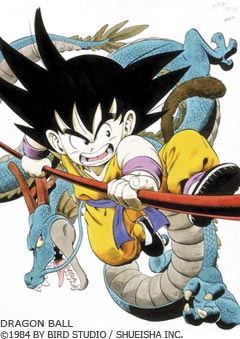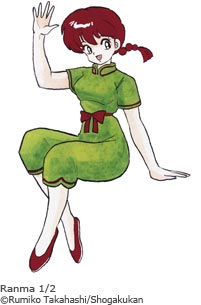Manga-related publishing of various kinds currently accounts for roughly 40% of the total Japanese publishing market. Manga are frequently used as original scripts not only for anime but also novels and TV dramas, and they often form the nucleus of media content. Since the 19th century, European and American satirical magazines, with their simple humour, and action films have been among the influences on manga. However, Osamu Tezuka, who made his debut in 1946, launched a style identifiable as modern Japanese. He drew complex stories that hinted at Disney animation, Hollywood movies and Russian literature, in which the characters suffer and feel anger, and which
sometimes end in tragedy, thereby transforming manga from simple entertainment into a thematically and artistically expressive medium. |
 |
|
The complexity of manga stories is further bolstered by the originality of the characters. Dragon Ball (by Akira Toriyama), which achieved global popularity, is a boys°« story of personal growth, as successive generations seek to gain strength in the world. The key theme is the process of growth. Ranma 1/2 (by Rumiko Takahashi), in which the protagonist changes sex on contact with water,
refers to confusion about gender. In the cyberpunk science fiction AKIRA (by Katsuhiro Otomo)
and in Monster (by Naoki Urasawa), a psychologicalsuspense series set in Germany after the collapse of the Berlin Wall, straight entertainment co-exists with an artistic essence. In fact, there are
many manga which appeal to a wide audience and which rival literature and film in their breadth. Avant-garde manga that appeared in the °«60s, as well as the girls°« comics of the °«70s that mirrored the inner life of girls going through puberty, drew the attention of contemporary intellectuals and artists. In Japan today, manga is now a generalised genre with an expressiveness that has permeated throughout society. |
 |
|
Text by Tomohiko Murakami (Manga Critic) |
||
Copyright 2007 - Ministry of Foreign Affairs, Japan |
||










